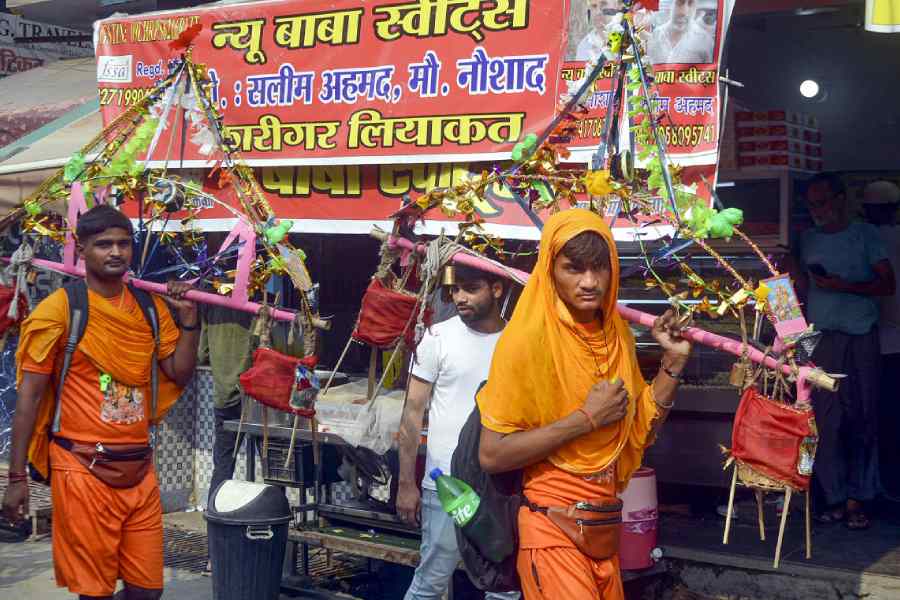The Supreme Court on Monday stayed till July 26 the directives by BJP-ruled Uttar Pradesh and Uttarakhand that eateries on the Kanwar Yatra route must display the owners’ names, terming the move “contrary to constitutional and legal norms prevalent in our country”.
The court said the order “infringed the secular character of our Republic” and added that it affected the right to equality, protection against discrimination on the basis of religion, among other things, and also the prohibition of untouchability.
The order by the BJP dispensations had been largely seen as a communal move aimed at targeting Muslim traders.
A bench of Justices Hrishikesh Roy and S.V.N. Bhatti passed the order while dealing with four petitions challenging the government directives as communal.
The petitions were filed by the NGO Association for Protection of Civil Rights, Trinamool Congress MP Mahua Moitra, academic Apporvanand Jha and writer-activist Aakar Patel.
Justice Roy, who was heading the bench, also issued suo motu directions for impleadment of Madhya Pradesh and Delhi as respondents as the annual pilgrimage also passes through these states.
The Kanwar Yatra started on Monday and is scheduled to end on August 4. The court listed the matter for further hearing on July 26.
Senior advocates Abhishek Manu Singhvi, C.U. Singh and Huzefa Ahmadi appeared for the petitioners.
Citing the directive issued by the Muzaffarnagar senior superintendent of police
on July 17 that was later extended to the entire state, the apex court observed: “The above (order) would suggest that the Kanwariyas in the holy month of Shravan while undertaking the journey to collect water from the river Ganges, do abstain from certain food items in their diet. This can be understood as abstaining from consuming any nonvegetarian food or in the event of those who follow strict vegetarianism, abstaining from consuming even onion and garlic.”
The apex court added: “If the intention is to provide only vegetarian food to the Kanwariyas, the impugned directives requiring the food business operators to display the names of their owners and employees, is contended to be contrary to constitutional and legal norms prevalent in our country.”
The petitioners had submitted that such directives were discriminatory and would further the cause of untouchability.
“It is argued that the dietary preference of the Yatris can certainly be ensured by requiring only vegetarian foods to be served en route to the Kanwariyas. The requirement of displaying the names of the proprietors of eating establishments, their address and also the names of their staffs could hardly achieve the intended objective,” the bench observed.
It added: “The contention is if the directive without any support of constitutional or legal provisions is permitted to be enforced, it will infringe the secular character of our Republic as enshrined in the Preamble of the Constitution. This will also have the effect of infringing on the guaranteed rights under Article 14, 15(1) and 17 of the Constitution.
“Since, as a consequence of the above directives, some of the employees of the eateries have been terminated, the argument is that this would also impact the rights of such employees guaranteed under Article 19(1)(g) of the Constitution.”
The bench said that the authorities were permitted to ensure that the Kanwariyas are served vegetarian food in accordance with their preferences and hygienic standards. The competent authority can issue orders under the Food Safety and Standards Act, 2006, and the Street Vendors Act, 2014, it said.
“However, the legal powers vested on the competent authority cannot be usurped by the police without legal foundation,” the apex court observed.
The petitioners argued that the impugned directives, which have fissiparous tendencies, had triggered penal actions against some food business operators along the Yatra route.
“The implication of the directions and their enforcement is spread across multiple states in the country covering the route of the Kanwariya yatris. Let notice, returnable on July 26, be issued in these writ petitions. The petitioners are permitted to serve dasti notice on the respective Standing Counsel for the State of Uttar Pradesh, State of Uttarakhand, State of Madhya Pradesh and Govt. of NCT of Delhi. If these states are not already impleaded, we order for suo motu impleadment of these states,” the court said.
Passing the interim order prohibiting the enforcement of the directive, the court said: “The food sellers (including dhaba owners, restaurants, food and vegetable sellers, hawkers, etc) may be required to display the kind of food that they are serving to the Kanwariyas. But they must not be forced to display the name/identity of the owners and also the employees, deployed in their respective establishments.”










